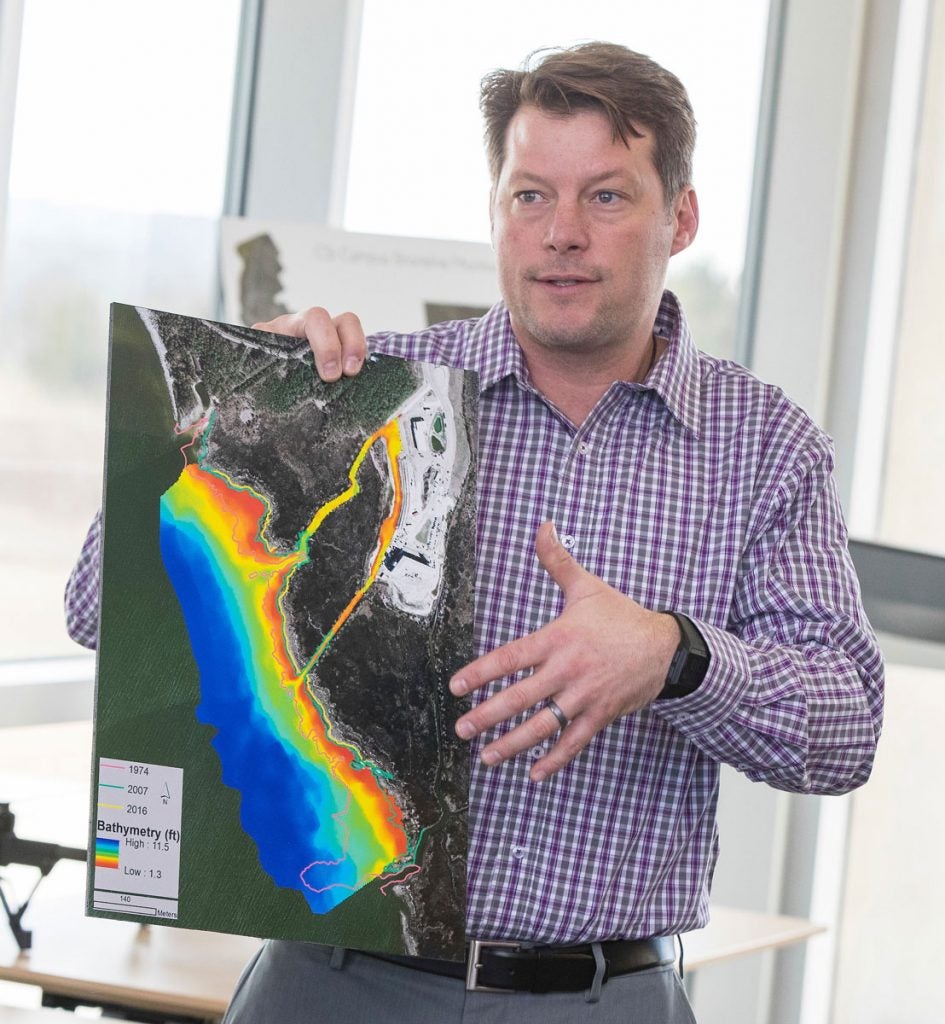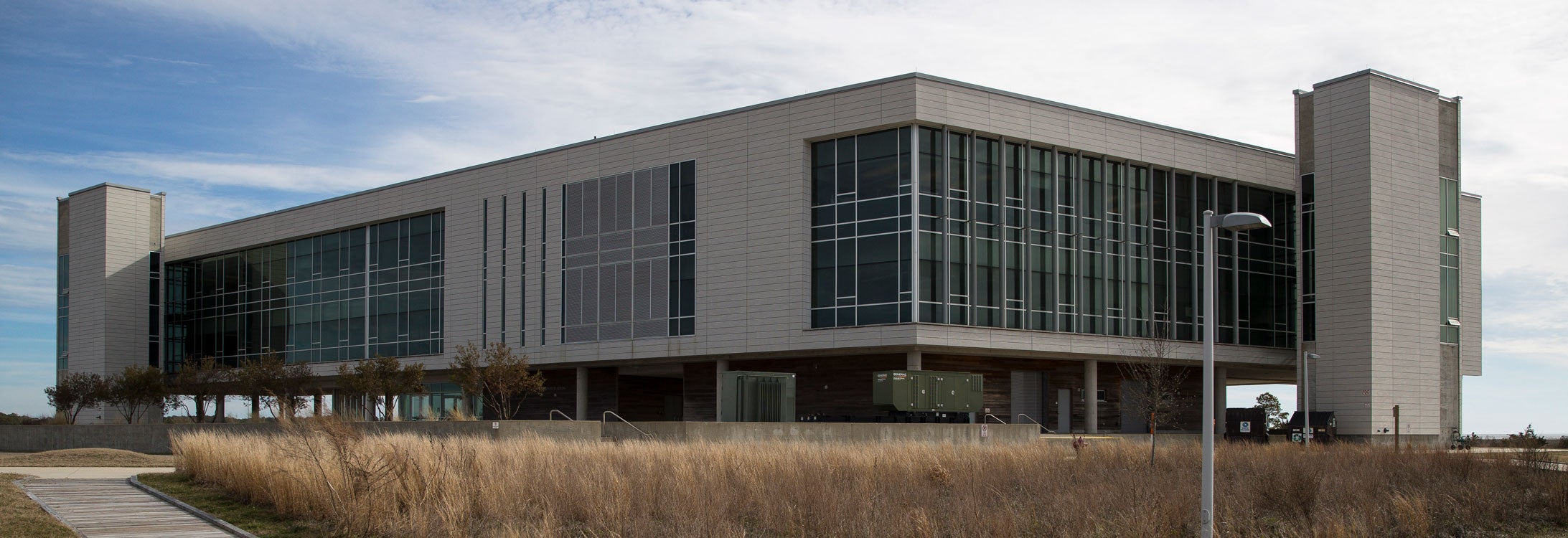COASTAL FOCUS
Outer Banks Campus, new academic unit maximize research, teaching resources
East Carolina University has renewed its commitment to coastal science by creating a new academic unit called Integrated Coastal Programs, which encompasses the Department of Coastal Studies and the Coastal Studies Institute, located at ECU’s Outer Banks Campus on Roanoke Island.
Dr. Reide Corbett, dean of Integrated Coastal Programs, will oversee the unit, which is the product of several years of strategic thinking about how ECU might grow and improve its coastal research and teaching programs. Looking back, on Roanoke Island there was the Coastal Studies Institute operated by the UNC System office, of which ECU was a member institution along with UNC and N.C. State; and at ECU there was the Institute of Coastal Science and Policy.
 “So you had these two institutes, both focused on research, education and outreach from a coastal perspective,” Corbett said. “The marriage between ECU and CSI became stronger and stronger, and there clearly needed to be a lead institution to help CSI see its vision, and ECU … stepped up to the plate to take that lead.”
“So you had these two institutes, both focused on research, education and outreach from a coastal perspective,” Corbett said. “The marriage between ECU and CSI became stronger and stronger, and there clearly needed to be a lead institution to help CSI see its vision, and ECU … stepped up to the plate to take that lead.”
The multi-institutional partnership with UNC and N.C. State, as well as dive and vessel operations, will continue at CSI under the new organizational structure, and Corbett said the new unit will break down barriers between disciplines to allow new approaches to coastal research.
“Think about it from a student’s perspective,” said Dr. Jay Golden, vice chancellor for research, economic development and engagement. “If you’re in engineering you’re trying to come up with new offshore energy designs or coastal engineering designs to address hurricanes, but then you have other faculty who are economists, other faculty who are looking at the social drivers for this.
“You really get a holistic approach, an interdisciplinary approach, and it’s exciting; you get to take what your innovation or design might be and really ground it in truth in regards to whether it makes economic sense and how the public will perceive it.”
The university is working to maximize the utilization of the Outer Banks Campus, which is home to the Coastal Studies Insitute. The facility was completed in 2012, and the campus spans 213 acres of marshes, scrub wetlands, forested wetlands and sound ecosystems.
Corbett’s vision for the Outer Banks Campus includes growth that will allow more students to take advantage of the facility’s location and direct access to coastal ecosystems. “Ultimately we want to grow the campus so we can bring more students out there for the entire semester and offer them a full load of courses,” he said.

Dr. Reide Corbett displays a satellite image showing erosion around ECU’s Outer Banks Campus. (Photo by Cliff Hollis)
ECU and CSI are currently leading research into renewable ocean energy, investigating ways to harness the power of waves and even the Gulf Stream as energy resources. Maritime history students have brought attention to the importance of maritime history with several discoveries including the identification of the mystery shipwreck at Pappy’s Lane.
Another major area of research at ECU and its Outer Banks Campus is coastal sustainability, Corbett said. Recent events like Hurricane Florence have brought attention to changing weather patterns and coastal flooding.
“It goes beyond what’s been in the news for so long with saltwater intrusion and sea level rise,” Corbett said. “It’s not just sea level rise; it’s changes in climate patterns that are going to lead to increased freshwater inundation and changes that we need to put in place for a more sustainable coastal community.”
ECU has long had a focus on the coast in its broadest definition, “from the coastal plain and its rivers and streams to our estuarine systems, as well as the continental shelf,” Corbett said. The university has also focused on the marriage between socioeconomics and the natural sciences, he added.
“We have all this incredible marine heritage sitting right off the coast,” he said. “And we have some of the wealthiest and some of the poorest counties just east of ECU.”
Integrated Coastal Programs and the Outer Banks Campus are also tied in with ECU’s investment in innovation and entrepreneurship.
“Students are interested in developing new micro-enterprises, new types of businesses and industries that leverage the vast resources in the ocean, far greater than we have on land, whether it’s energy or to feed the world, or new types of products that are more sustainable because they’re natural and ocean-based,” Golden said. “Or finding ways for existing businesses on the coast to be more profitable, more sustainable financially. That’s going to be something that we want to leverage the campus and the faculty to do.
“How much fun would it be to be a student and be able to go to the Outer Banks and work on developing new micro-enterprises?”
The Outer Banks community is interested and invested in ECU’s commitment to the region, Corbett said. “They’re excited about what we’re doing and the vision for the Outer Banks Campus. And we’ve been engaged and talking with the community about some of our concerns for the growth that we see at the campus.”
Golden said Corbett’s understanding of what it means to live in eastern North Carolina and the importance of the Outer Banks are part of what made him the best choice to lead Integrated Coastal Programs.
“Reide was born and raised in eastern North Carolina, so it’s in his DNA,” he said. “He had a vision of where he wants to take ECU at the Outer Banks and CSI, for ECU to become a nationally and internationally recognized leader in the sciences.
“You’d be hard-pressed to find another program on campus that epitomizes where we want to go and the opportunities for excellence in education, research and outreach that we have at CSI and ECU’s Outer Banks Campus.”
